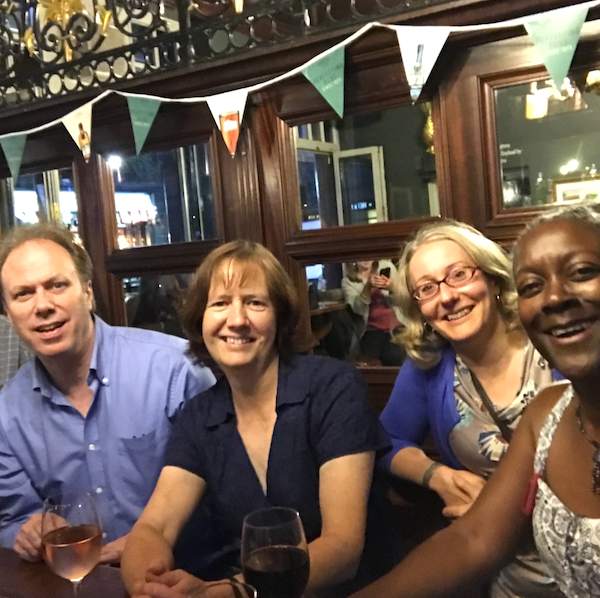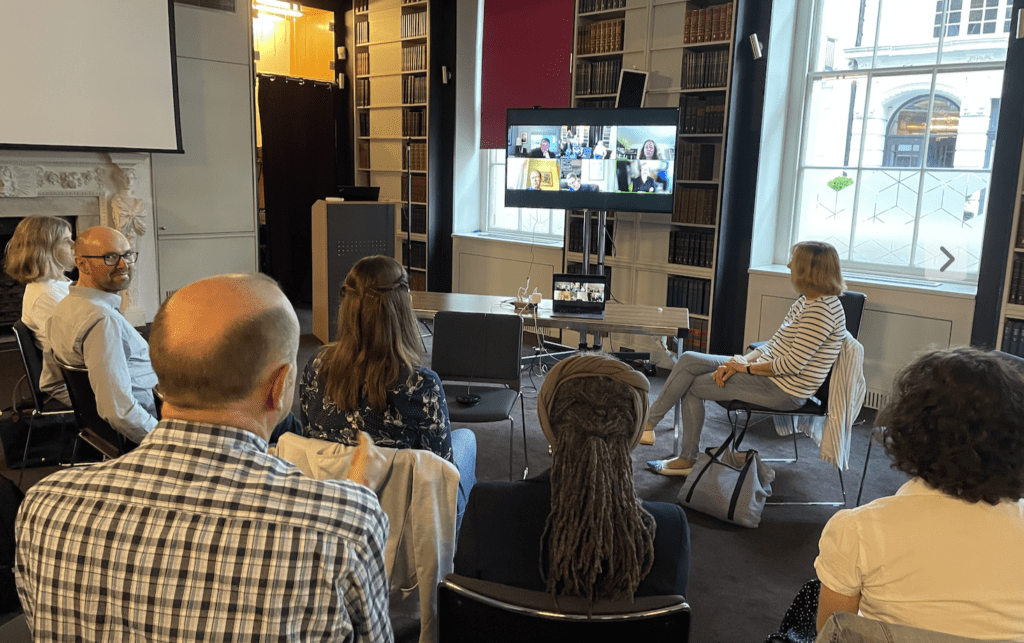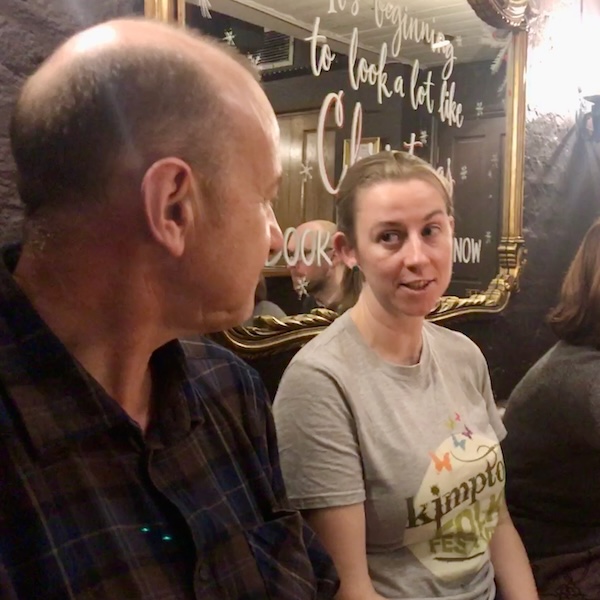A few years after LabLit.com launched in 2005, I was approached by London’s Royal Institution (Ri) and asked whether I’d like to preside over a new monthly book group devoted to discussing ‘lab lit’ fiction. They thought it would be a nice way to bring scientific ideas to the public, and they wanted to call it ‘Fiction Lab’.

Of course I said yes. Our first meeting took place in June 2008, where a small group of about a dozen people discussed Philip Ball’s The Sun and Moon Corrupted. The author kindly came along too, which was a bonus.
In the intervening 17 years, we have met every month nearly without fail, discussing the good, the bad and the ugly. (As most book group attendees will know, the bad books are always more fun to discuss than the good ones, though we are always surprised by how polarized the views are: the book might score a full ten points from one member, and negative numbers from another. Once a book was even tossed across the room in exasperation.)
After our Ri session, we’d decamp to the nearby King’s Head for more chat, drinks and signature cheesy chips. For Fiction Lab’s tenth anniversary in 2010, the Ri kindly hosted a gala event in their storied Library, the very same room where we’d met for the first time. But in reality, we met all over the building over those years, wherever there was a room free – a few times even in the basement, or in the famous prop room where all the stuff from the Christmas Lectures is stored. We often had authors come along to chat – never to sit in on the regular group, as we didn’t want to dampen anyone’s true opinions, but they’d come in afterwards for a (polite!) Q&A session. These exchanges were always fascinating, no matter how people had felt about the actual book.
We kept meeting even when the Pandemic drove us online in 2019. Once the lockdowns were over, we resumed as a hybrid group, having realised the benefits of allowing far-flung members to join in. But unexpectedly, the Royal Institution turfed us out in September 2023, having decided that they could no longer afford setting aside periodic space for us when there were clients who could pay. So even though we’d offered an enthusiastic but unremunerated public engagement event for so many years, promoting the Ri’s cause, our time there was sadly at an end. Homeless but undaunted, we kept the name, went back online and have been there ever since – which still works, although we all miss the cheesy chips.

One of the most remarkable things about the group is how many longstanding members we still have: those who first came in June 2008, alongside regulars who started later, but still have been coming for many years. While others have come and gone, this steadfast bunch – who I call the LabLiterati – have remained loyal. They came from all walks of life and were all attracted to the group for different reasons. Some are scientists, others are decidedly not. Some are members of “normal” book groups too, in parallel, and others who have left London have seeded their own lab lit book groups in their new locations, but still meet up online each month with us. They – we – have become friends who socialize outside of literary meet-ups, and who keep up a robust literary chatter on the dedicated WhatsApp.
This dedicated group of people has become the world’s experts on lab lit novels – the constraints, the challenges, the triumphs and failures of authors trying to get across a world that is sometimes difficult to pin down and whose fundamental concepts can be prohibitively abstract. Did the scientist character come across as realistic, or were they freighted with disappointing stereotypes and cliché? Did the writer manage to avoid falling into the trap of using of informative dialogue and infodumps to explain the science to an unsuspecting non-scientist character? Was the science woven in seamlessly in a way that was clear but not annoying to those who might know the subject?

The LabLiterati, especially Dom, have also been instrumental in helping to keep the Lab Lit List stocked up with the latest books, and many have contributed to the website over the years, including original stories. I can’t imagine LabLit.com having lasted as long as it did without the support and friendship of this remarkable group of people.
Below, in celebration of our 20th anniversary, I’m highlighting some of the LabLiterati , and their literary picks, in their own words. If you’d like to join the group, please email us at editorial@lablit.com!
Name: Simon
Year joined: 2014
Favorite lab lit novel:
The only book I’ve so far given 10/10 was The Red Arrow by William Brewer – a mind-bending journey through one man’s struggle with, and recovery from, depression, incorporating interpretations of quantum mechanics and space-time with humour, playful writing, and great insight into the human condition. I loved it!
A good lab lit novel must be (three words):
Engaging, Accurate, Innovative
What do you value about the group?
I’ve made great friends, and have read lots of interesting books that I wouldn’t have otherwise read. Even the bad books are fun to talk about!
***
Name: Simon (no relation to the first Simon!)
Year joined: 2024
Favorite lab lit novel:
Orbital by Samantha Harvey. I really liked the flow of the book. It conveyed complexity with clarity and simple language in a quite special way.
A good lab lit novel must be (three words):
Distinctive, Relatable, Enriching
What do you value about the group?
It is enough of an addition to my general life that my colleagues at work will ask what I am reading for book club this month, knowing that it will prompt at the very least an entertainingly acerbic response but often an introduction to something that they might wish to read. In general, it has connected me with interesting and informed people through the excellent conversions and has directed me towards books that I might never have picked up.
***
Name: Catherine
Year joined: Founding member: I was at the first meeting in 2008!
Favorite lab lit novel:
The Housekeeper and The Professor by Yoko Ogawa. We read this ages ago but it’s the one novel out of all the many we’ve read which sticks in my mind for good reasons. On checking it out now on Amazon I see that Publishers Weekly called it ‘a poignant tale of beauty, heart and sorrow’ – which I’d go along with.
A good lab lit novel must be (three words):
Accurate, Sympathetic, Illuminating
What do you value about the group? It’s a place where curiosity and dissent are valued and celebrated, within a supportive and respectful group of amazing individuals.
***
Name: Mariana
Year joined: 2022
Favorite lab lit novel:
The Rosie Project by Graeme Simsion. Light, funny, with an original plot and a bit of science. But I haven’t read many lab lit books yet and still hoping to find more good ones.
A good lab lit novel must be (three words):
I couldn’t narrow it down so here are two answers:
(1) Good fictional plot. (2) No real scientists! (Editor’s note: there is a hardcore faction of the group who really hate when novelists attempt to write about real historical figures and put words in their mouths…which is very common in the genre.)
What do you value about the group?
A great opportunity to meet new friends with similar interests, read books that I might not read otherwise, have nice discussions, and learn new science stuff from other areas.
***
Name: Philip
Year joined: Day one! (2008)
Favorite lab lit novel:
Cannery Row by John Steinbeck: Beautifully drawn, engaging characters run riot through an intriguing, unpredictable plot in which the crucial marine science thread is seamlessly woven into the story rather than shoehorned in as an awkward add on. You are inextricably pulled into this book – wanting to know what comes next but also hoping it never ends.
A good lab lit novel must be (three words):
Plot, Characterisation, Creativity
What do you value about the group?
This book club has been a marvellous opportunity to make great friends – we are a close-knit group, even enjoying off-piste adventures such as visiting behind the scenes at Charles Darwin’s Down House. The book club is a relaxed, free and open space where everyone is encouraged to give their opinions on the books we read. We have the added bonus that some of the members are senior medical researchers or science communicators, so they can often offer a unique perspective on the content of the lab lit books. Plus having the authors occasionally visit the club is an invaluable and illuminating experience. Many of the authors have said that they enjoy the probing and expert questioning about their work.
***
Name: Tricia
Year joined: 2015
Favorite lab lit novel:
Cannery Row by John Steinbeck. So much warmth in describing such a variety of people. So quirky. So well written. I also really enjoyed The Bloodless Boy by Robert J. Lloyd, as it ticks boxes for sorts of fiction I enjoy: historical, and murder mystery.
A good lab lit novel must be (three words):
Plot, Characters, Facts
What do you value about the group?
Intelligent discussion about books I would probably never have otherwise read. Fiction Lab has become a group of very good friends, who may have different opinions about the books we read but otherwise find a lot to agree about – like good food and drink and interesting places to visit.
***
Name: Dom
Year joined: 2015
Favorite lab lit novel:
Very hard to say that one book stands out as I do not remember much fiction for long, except in very broad terms. Possibly C.P. Snow’s The Affair, or Wang Xiaobo’s Golden Age, but don’t ask me why now! There are comparatively few that are based in actual laboratories, but one I recall liking in that setting was Austin Duffy’s This Living and Immortal Thing. I love stories set in very cold places like Antarctica (a subgenre I like to refer to as ‘Ice lab lit’ – there are surprisingly a lot of these on the List…alongside ‘Wolf lab lit’). I also like literary lab lit; often books no one else likes; and novels where the author has not felt a need to tie up loose ends in a neat package – knowing what not to say is as important as what one does say.
A good lab lit novel must be (three words):
Story, Science, Snow
What do you value about the group?
I miss when we met in person and drank beer. I value the frank exchange of views (and I like to argue!). I am interested in what other people find curious in what we read, but some people are never satisfied….
***
Name: Becky
Year joined: 2012
Favorite lab lit novel:
Flight Behaviour by Barbara Kingsolver. It’s engaging, accurate, and gives pertinent insights related to both nature conservation and social inequalities.
What do you value about the group?
Friendship. This is particularly relevant as we mark five years since the first Covid-19 lockdown – at a difficult time, Fiction Lab friends kept me feeling connected.
***
Name: Richard (no relation to our Deputy Editor!)
Year joined: 2008
Favorite lab lit novel:
Litmus, a collection of short stories rooted in science by well-known authors. The quality is quite varied but the best are truly excellent. In fact, reading Litmus inspired the group to embark on our own science-in-fiction short story project (published on Lablit.com under the series title The League of Imaginary Cats), and several of us, to continue writing.
A good lab lit novel must be (three words):
Beware the infodump!
What do you value about the group?
Discovering novels and short stories I’d otherwise never have come across, and becoming friends with a fantastic and diverse group of interesting people. Despite not attending regularly since the Pandemic, I still feel a part of the group and maintain the friendships made there.
***
Name: Joe
Year joined: 2018-ish
Favorite lab lit novel:
Arrowsmith by Sinclair Lewis. As a work of literature it’s merely good, but as lab lit it’s superlative. A novel that truly captures the highs and the many, many frustrations of a life in research. I felt a strong sense of recognition on every page, which isn’t bad for a hundred-year-old novel.
A good lab lit novel must be (three words):
Enlightening, engaging, thought-provoking
What do you value about the group?
Lovely people; interesting, intelligent discussions; a reason to read things I might otherwise have missed; the (rare) thrill of discovering an overlooked masterpiece; and the chance to let off steam about the many that aren’t.



